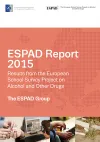European School Survey Project on Alcohol and Other Drugs (ESPAD)

ESPAD–EMCDDA cooperation
Collaboration between the ESPAD network and the EMCDDA started in 1995, when the agency was first set up. The collaboration was formalised by a ‘cooperation framework’ agreed in 2007. The agreement recognised the mutual benefits of joint activities and called for closer collaboration in the exchange of information and expertise to improve the availability, quality and comparability of school survey data, as well as to gain analytical insight from the data available in this area.
The results of joint activities undertaken over the years have clearly shown the benefit of this cooperation for both organisations. ESPAD data have become an increasingly important component in the EMCDDA’s reporting on the European drug situation. Besides hosting the 2011 ESPAD Project meeting, the EMCDDA has supported the dissemination of ESPAD data through the production and editing of the 2007 and 2011 ESPAD summary reports and their translation into 23 languages. The EMCDDA has also supported ESPAD data collections in several Balkan and eastern European countries in the context of the IPA and ENP projects.
Based on the mutually positive experiences, a joint statement to scale up cooperation between ESPAD and the EMCDDA was adopted at the Annual ESPAD Project Meeting on 28 November 2011.
In the joint statement they agreed to:
- develop an enhanced dissemination strategy of ESPAD findings (including a multilingual approach);
- work together to ensure harmonisation of methods and to support methodological development;
- develop a joint work programme to contribute to long-term sustainability of the ESPAD network (e.g. joint analyses, data sharing); and
- meet regularly to review joint activities.
In recent years, the linkage between ESPAD and the EMCDDA has become more dynamic and intense. The Swedish government has been supporting ESPAD international cooperation through CAN (Swedish Council for Information on Alcohol and other Drugs) from its early years. In 2013, however, the Swedish government announced that it would discontinue its support for the international coordination from 2015, and considered that the natural place to host the coordination would be the EMCDDA. The agency’s Management Board also insisted on closer collaboration between the EMCDDA and ESPAD. The office of the ESPAD coordinator at that time (Björn Hibell) was transferred to Lisbon during 2014 and 2015.
In 2016, the EMCDDA took on the responsibility of producing the 2015 ESPAD report, a project requiring a considerable amount of human and financial resources. Alongside the production of the report, the EMCDDA has developed a part of the ESPAD website that will include the electronic version of the 2015 report with an interactive data interface.














